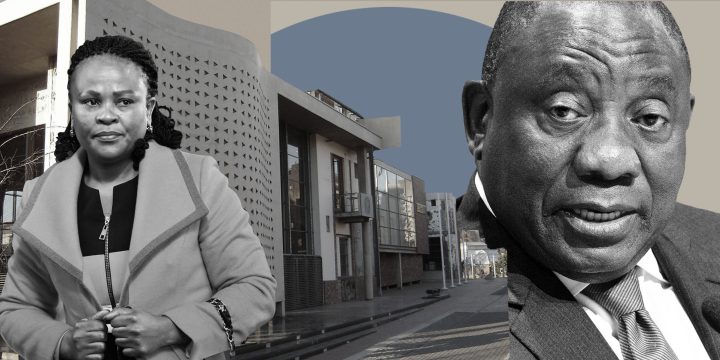rescission bid
Public Protector challenges Constitutional Court’s finding on CR17 funding report

Busisiwe Mkhwebane is challenging the Constitutional Court’s decision to uphold a ruling setting aside her report on President Cyril Ramaphosa’s CR17 campaign. This comes shortly after former president Jacob Zuma’s unprecedented application to the apex court to rescind his 15-month sentence for contempt of court.
Public Protector Busisiwe Mkhwebane has approached the Constitutional Court to request that it rescind or reconsider its decision to reject her appeal against the North Gauteng High Court’s ruling to set aside her report on funding for the CR17 election campaign.
On Friday, the Public Protector issued a statement saying she had applied for “the rescissions, varying and/or reconsideration” of the ConCourt’s dismissal earlier this month.
The High Court set aside Mkhwebane’s report on the CR17 campaign in March last year on the grounds that she had “reached an irrational and unlawful conclusion on the facts before her”.
The ConCourt also upheld the finding that the Public Protector was “plainly not authorised” to investigate the affairs of the CR17 campaign, because these did not relate to the activities of an organ of state.
In particular, Mkhwebane is challenging what she refers to as the “patently erroneous finding” that she changed the Executive Ethics Code by replacing the word “willfully” with “deliberately or inadvertently”.
“This finding was pivotal to the decision to dismiss the appeal,” she wrote.
The report published in July 2019 found that Ramaphosa had misled Parliament about a R500,000 donation towards his campaign by Gavin Watson, CEO of Bosasa – now called African Global Operations.
The Public Protector’s office will argue that the court relied on the old version of the Executive Ethics Code published in 2000, while Mkhwebane “invoked, verbatim, the provisions of the amended version of 2007, which the Constitutional Court has itself endorsed as recently as March 2016 in the EFF v Speaker of the National Assembly case”, the statement read.
Mkhwebane alluded to the present application earlier this month.
Her office said there were implications of the case being dismissed on her “personal and professional capacities”.
“The dismissal of the appeal also has serious implications for the work of the office, which is the sole enforcer of executive ethics under the Executive Members’ Ethics Act [of] 1998,” the statement said.
This comes hot on the heels of former president Jacob Zuma’s unprecedented application to the Constitutional Court to rescind his 15-month sentence for contempt of court. On 12 July the court reserved judgment on the matter.
According to Constitutional law scholar Pierre de Vos, Zuma’s application was a “desperate attempt to avoid the consequences of his actions” and “an elaborate exercise in gaslighting”, he wrote in a Daily Maverick op-ed.
In a Daily Maverick article, Marianne Merten referred to Zuma’s court action as “delays by legal strategy”, a tactic “firmly embedded in Zuma’s arsenal”. The damage arising from Zuma’s legal meandos – political mobilisation by court action is an old tactic in the Zuma playbook, going back to his rape trial, and May 2006 acquittal – is immediate, and unfolds at different levels.” DM

















 Become an Insider
Become an Insider
The only reasonable explanation for this is that punitive cost orders are either addictive or capable of satisfying professionally and legally-rooted masochistic impulses and desires.
Busisiwe is obviously undeterred by the number of judgments against her … even for elementary aspects of law …. BUT challenging the constitutional court findings … must be the limit ! BUT then … incompetence (like arrogance) does not recognise itself … does it ? Another dilly Dali effort in the making … and lining his already bulging pocket no doubt ! One can only hope the cost orders against her personally, will make some impact !
This reeks of desperation. Shame. Hopefully parliament deals with her swiftly.
The RET faction are trying to delegitimize the ConCourt as a last stand. Desperately trying to keep the criminal networks in place.
The 2010 code of ethics said “willfully”. She used the 2007 code of ethics which said “deliberately or inadvertently” and she focussed on “inadvertently”. Now she/Dali claims that the concourt used the 2007 code in a 2016 judgment.
Suppose her claim is true and suppose the 2016 concourt relied on the “inadvertently” part rather than the “deliberately” part. Even if these unlikely claims are true, she is still not off the hook. This is because the concourt decided that she is “plainly not authorised” to investigate the affairs of the CR17 campaign.
Make her personally liable for costs. Finish and klaar.
“Groundhogs Day” continues. The Public pRETector at it, again. ANC faction fights ANC faction, both sides using taxpayer money, again. Probably no defining and final court judgement, again. A president spending huge amounts of money preventing disclosure when he claims there is nothing to hide, again. ANC energy and focus diverted from even looking for meaningful solutions, again. Parliament delaying (avoiding?) decisive action, again.
As a non-legal expert, I’m struggling to follow the background on this issue. My understanding at this point is that an executive ethics code was gazetted in 2000, a replacement was drafted in 2007 but never formally gazetted. The ministerial handbook inadvertently(?) includes the 2007 version, but since that was never gazetted, it has no legal standing. Although the CC did refer to the handbook in its March 2016 ruling, that reference was to a paragraph in the handbook that is common to both the 2000 version and the 2007 version. Am I in the ballpark? Is there somewhere I read more on this?